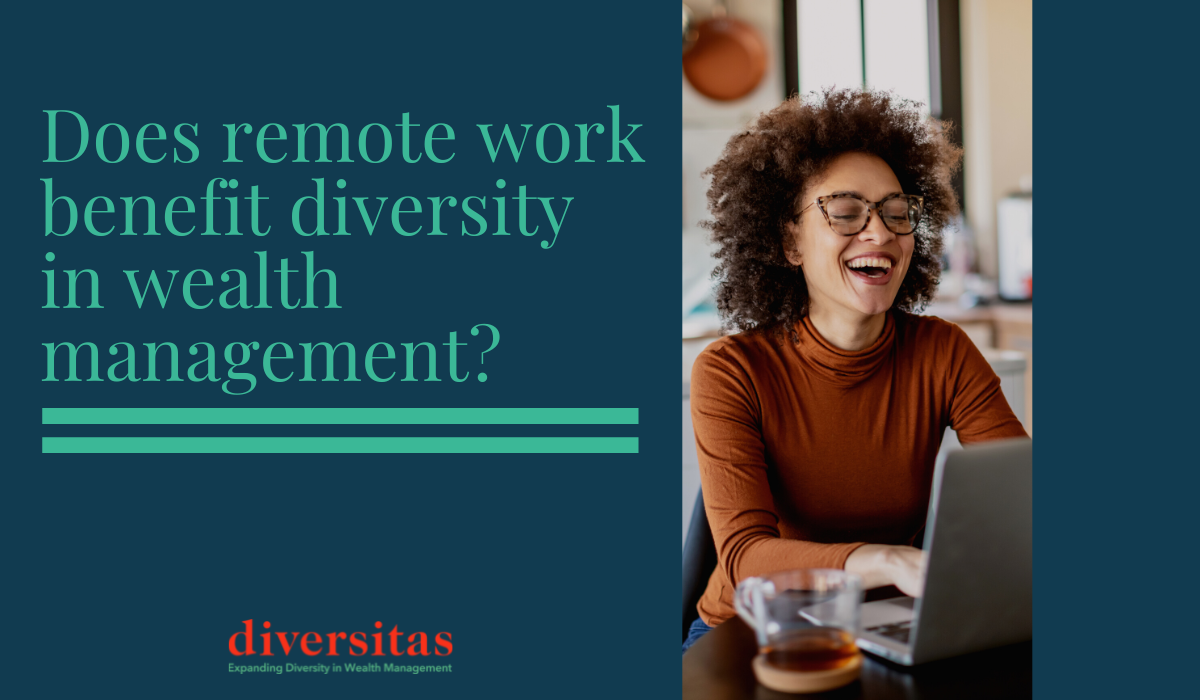As the economy changes, organizations have to adjust accordingly. LinkedIn’s data shows that progress made during the pandemic lockdown — such as businesses making accommodations for remote work and allowing for a more flexible schedule — could diminish, which isn’t what employees want.
The data also showed that job listings for remote work are declining, significantly affecting Black, Hispanic, and female job seekers.
What does this mean for the future of diversity in the workplace, especially in the wealth management industry?
Remote work benefits underrepresented groups
LinkedIn’s data is based on information from 10 million accounts from January 2019 to October 2022 for a broad range of industries. Some of the findings include:
- There was a 16% and 17% increase in Latino and Black candidates, respectively, applying for remote jobs.
- Regarding hiring, Black workers saw a 24% increase, while Latino workers saw a 5% increase.
- Approximately 20% more women applied to fully-remote jobs, while the number of men applying decreased by the same percentage.
Earlier this year, Future Forum conducted a survey that revealed more white workers (21%) wanted to return to the office as it was pre-pandemic, while only 3% of Black workers wanted in-office work to return.
During the lockdown, many financial advisers worked remotely for the first time. In 2021, research from the CFA Institute showed that 53% of financial advisors were more efficient when working remotely.
For some advisors, this encouraged them to work independently, or for firms that had the technology and policies that would allow them to work from anywhere.
Racism still exists in office environments
While there could be numerous reasons remote work is better for diverse workers, a personal account published by Slate showed that racism and microaggressions are still very present in the workplace.
The author, Leron Baron, wrote about his experience as a Black person working in an office. Here’s some of what he shared:
- Receptionists often questioned my credentials, such as my badge, position, and work status.
- Microaggressions such as the “compliment” of “You speak so well” when giving a presentation, the surprise when you are competent at your job, the assumption that you are a “diversity hire,” the requests to touch your hair.
- Accusations of theft if someone’s property was to come up missing, security stopping you on campus because they don’t believe you work there, racist jokes, the opposition to any type of DEI training or workshops.
Baron also pointed out that Black employees often experience increased stress levels due to low-paying jobs and jobs at risk of dissolving because of technological advances.
In the wealth management industry, research from Arizent echoed Baron’s points:
- 60% of women and people of color said their input is requested on meaningful items (compared to 80% of white employees).
- Women of color regularly reported encountering unhealthy work environments with no support from leadership.
- 24% of women of color are likely to report the workplace as toxic, compared to 12% of white women.
For many, the pandemic lockdown was their first time working from home. This allowed employees to focus on the work instead of office politics, racism, and other in-office issues often affecting minority groups.
Remote work won’t end racism
Of course, racism doesn’t dissolve when employees work from home. Underrepresented groups still experience bias via email, phone calls, and video meetings.
It’s clear that organizations need to address racism — and any related harassment — directly. Training and educational programs, mentorship opportunities, and actively preventing tokenism are all steps any organization should take to create a more diverse and safe work environment for all its employees.
Make a plan to increase your team’s diversity, whether remotely or in-person, by setting clear DEI goals and tracking their progress.
For the wealth management industry, working remotely has benefits for advisors and their clients. Working from anywhere means you can virtually meet with clients who live anywhere, and who may have additional needs at home (such as childcare or taking care of elderly parents).
With advisors pushing back on coming into the office full-time, many firms are embracing remote work (as many as 50%) or creating hybrid schedules. Working remotely has many benefits for all sides of the business, and it influences change for the long-haul.
If you’re an organization interested in attracting more diversity to your company, please reach out to us at [email protected]. We’d love to hear from you!

